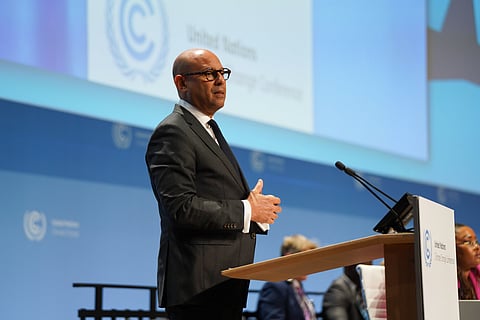Bonn Climate Conference 2025: Capacity building, Just Transition and NCQG in talks at Sharm el-Sheikh Dialogue
As climate finance remains in contention ahead of COP30, the Sharm el-Sheikh Dialogue convened in June 2025 to advance critical conversations on Article 2.1(c) of the Paris Agreement — examining how countries can develop financial systems that support equitable, low-carbon transitions while meeting global climate finance goals.
The Dialogue’s first workshop this year on Article 2.1(c) of the Paris Agreement convened at the June Climate Meetings in Bonn, Germany, between June 16 and 26. The Dialogue was set up at the 27th Conference of the Parties (COP27) to the United Nations Framework Convention on Climate Change (UNFCCC) in Sharm el-Sheikh, Egypt, in 2022 to explore how global financial flows can be aligned with low-emission, climate-resilient development pathways.
At the workshop, experts, policymakers and practitioners held discussions over the course of three thematic sessions. These focused on capacity building for nationally determined financial sector development, transition planning for low-emission and climate-resilient development and opportunities to support the New Collective Quantified Goal (NCQG) on climate finance through Article 2.1(c).
The co-chairs of the workshop will take stock of the discussions as they prepare for the second workshop of 2025 under the Sharm el-Sheikh Dialogue at COP30 later this year in Belém, Brazil.
Capacity building for financial sector development
The discussions on building nationally determined financial system capacities for climate resilience emphasised the integration of climate risks into financial systems. A representative from Germany’s central bank, Bundesbank, highlighted their efforts to quantify the impacts of climate change on global financial stability — with physical risks potentially reducing global GDP by 15 per cent by 2050 under current policies and net-zero policies bringing the damage down to 8 per cent.
The secretary of the Brazilian state of Rio Grande do Sul highlighted real-world vulnerabilities faced by at-risk populations: The state experienced catastrophic floods in 2024 which affected 95 per cent of its municipalities, yet only four of them had climate adaptation plans.
As part of the solutions to capacity-building challenges in the Global South, the Global Capacity Building Coalition (GCBC) — established at COP28 to achieve transition goals and unlock sustainable development — presented its open-access digital platform, the GCBC Accelerator. The platform is designed to improve access to capacity-building tools for financial institutions and finance professionals.
Additionally, parametric insurance was in focus as a tool to improve financial preparedness and resilience, wherein the insurance payout can be made once certain parameters are breached — reducing long wait periods and addressing liquidity concerns. However, limitations were also noted, such as its ineffectiveness for all risks and the high costs of implementation in vulnerable regions.
Transition planning for low emissions development
At the second session of the workshop, speakers showcased national efforts within Brazil and South Africa to shift towards sustainable economies while ensuring equity. Brazil highlighted its electric bus programme and its green investment platform, which aims to mobilise international capital for local decarbonisation projects.
A representative from the Development Bank of South Africa spoke about investment plans under South Africa’s country platform, which will require support from international institutions and public development banks. He also detailed examples of utilising blended finance models for renewable energy, reusable water and adaptation projects. Another point of discussion was advocating for corporate transition plans that align with and feed into, national transition pathways to lower capital costs and attract investment.
However, critiques of transition planning were also raised — frontline communities such as those in the Gulf South of the United States exposed how natural gas expansion (with natural gas being promoted as a transitionary fuel) creates “sacrifice zones” with severe health impacts. Moreover, while investors called for local climate-risk disclosures, this raised concerns about credit rating agencies downgrading vulnerable countries, affecting their ability to raise capital for green projects.
Supporting NCQG implementation through Article 2.1 (c)
In the final session, experts outlined strategies to align global financial flows with the NCQG’s climate finance target of $300 billion annually for developing countries by 2035. Economist Ulrich Volz spoke about redirecting fossil fuel subsidies — which reached $900 billion last year — towards clean energy projects. Another key concern was domestic resource mobilisation, highlighted as crucial for bringing down the high cost of capital in developing countries.
The Asian Development Bank demonstrated its country-level projects in Asia aimed at creating enabling environments for climate finance, focusing on green finance, private sector development and the operationalisation of country platforms that can turn national climate plans into investable pipelines. A delegate from the UN Climate Change High-Level Champions stressed the need to integrate physical risks into private investment decisions and increase finance flows towards adaptation and resilience. The UN Industrial Development Organisation advocated for a shift from financing fragmented projects to financing national transition pipelines.
Towards Belém
The dialogue revealed stark tensions between top-down regulations and market mechanisms on the one hand, versus equity and nationally determined approaches on the other. Developing country parties stressed differentiated pathways and the principle of Common But Differentiated Responsibilities within the financial sector reform discourse. While Article 2.1(c) aims to align global finance with our collective climate goals, its implementation must avoid exacerbating historical inequalities and climate injustices.
What: First 2025 workshop of the Sharm el-Sheikh Dialogue on Article 2.1(c) of the Paris Agreement.
Where/When: Held during mid-year UN climate talks in Bonn, Germany (June 16-26, 2025).
Focus Areas:
Capacity building for climate-resilient financial systems
Transition planning for low-emission development
Support for the New Collective Quantified Goal (NCQG) on climate finance
Key Highlights:
Bundesbank warns climate risks could slash global GDP by 15% by 2050.
Brazil’s 2024 floods expose gaps in local adaptation planning.
GCBC Accelerator launched to support finance capacity in the Global South.
South Africa and Brazil showcase national transition and finance platforms.
Concerns raised over climate disclosures penalising vulnerable economies.
Next Steps: Findings to feed into the second 2025 workshop at COP30 in Belém, Brazil.

